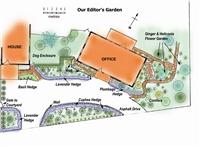 CAREERS IN GARDEN DESIGN
CAREERS IN GARDEN DESIGN
Garden Design is a unique profession that blends science with art.
Designing a garden involves:
1. Communicating with the client to determine their needs and desires.
 2. Surveying the site, and creating a base plan (drawing)
2. Surveying the site, and creating a base plan (drawing)
3. Determining potentials and limitations (What is and is not feasible)
4. Systematically working through a logical design process, to develop, step by step, a concept that is physically achievable, as well as being functional and aesthetically appropriate.
-
|
GARDEN DESIGNERS ARE NOT LANDSCAPE ARCHITECTS!
A landscape architect has usually completed a university degree, and will be able to undertake far more complex and sophisticated projects (eg. Calculating structural specifications for landscape features such as walls, buildings, bridges, etc).
A landscape architect may for instance determine mathematically the way in which a path needs to be constructed in a public park in order to cater to large amounts of traffic.
The distinction between garden design and landscape architecture is to an extent blurred.
Garden designers do however, tend to focus more strongly on use of plants in the design; and landscape architects, more on the way non living components are arranged.
|
Typical jobs or career paths
Some garden designers work full time doing nothing but garden design.
Others combine garden design with another job, such as landscape contracting, garden consultancy, garden writing or retail nursery.
The amount of work available in garden design has increased in recent decades, particularly in more affluent parts of the developed world. In situations where both husband and wife work, and money is relatively available, all home services including garden design have become growth industries.
A garden design career commonly starts by either:
- Designing your own garden, and discovering you love the experience
- Drifting into it from working in a related field such as gardening or architecture
- Studying a garden design course because you just love gardens or gardening.
- Landscape contractors often seek to develop design skills to broaden the services they can offer a client; or to give them a less physically demanding income source they can move into as they get older.
- Garden centres sometimes offer a garden design service to entice people to buy plants from them. They may employ, or do a deal with a designer; or the owner or staff may even go and learn design themselves.
- Garden writers or consultants may offer a design service, to broaden their income opportunities.
- In some urban centres, garden design courses have become popular with housewives. Though many pursue this for personal interest, for some, the experience may evolve into a very profitable small business.
Who Employs Landscape Designers
-Most are self employed
-Others are employed by horticultural businesses (eg. garden centres; landscape contractors).
-Planning or design firms (eg. Architects, engineers, Town planners)
-Developers or construction companies
-Government (eg. Parks departments)
Remuneration and Advancement
Consultants may charge anything from low to extremely high rates for their design work. A garden design for a 500 to 1000 sq. metre property (home) may cost as much as a person’s weekly wage; or much more if designed by a well known and prestigious designer. The ability to command high fees will depend upon reputation and that will only develop over time, and if you are able to develop a unique and popular flair to your work.
Designers who are able to obtain employment (part time or full time) with others, should be able to earn a professional level salary.
Advancement in this industry is most dependant upon reputation. If your work becomes famous, you will also, and your ability to charge more will increase. In some places, a good way of advancing your career as a designer is to create display gardens in a major garden show. Designers who win medals at Chelsea Flower Show (London) or MIFGIS (Melbourne) for instance, will find it easier to get work; and often be able to command higher fees.
Career Risks & Stresses
Every job has certain risks associated with it; and even something that seems as easy going as garden design can still bring worries from time to time.
Self employed garden designers face the same problems as any other small business person (eg. Dissatisfied clients refusing to pay, not having an income when you are ill, too much work at times and too little at other times, people being slow to pay, etc).
While being your own boss can be a negative for some, others see it as a big bonus in this career. If your personality fits not only the job, but also the way of life, this could be a career you are well suited to.
How to Distinguish Yourself from the Competition.
Many of the most successful garden designers are those who have specialised in a particular garden style. For a self employed designer, this is an obvious way of making yourself stand out from the competition. Consider for instance, becoming a specialist in designing modern gardens, cottage gardens, formal gardens, tropical gardens or Japanese gardens.
Some designers focus on residential designs, and others on commercial work, public parks, or even children’s playgrounds. Just think of the number of schools and pre schools that need playgrounds designed.
If you are seeking employment with someone else as a designer, you should consider the courses you study and the skills you develop. Different skills will be attractive to different types of firms (or organisations).
Professional Bodies
Professional institutes and associations in both the landscape and horticulture industries are useful to join. Many will require you to hold some type of qualification (or be a student) before joining.
Becoming active within such an association or institute will help you develop valuable contacts within the industry; and remain current with trends and developments.
Insurance
If you establish your own consultancy, you should investigate Professional Indemnity Insurance and any other necessary insurances. The situation does vary from country to country (and time to time), but the issue of insurance should not be neglected.
Legal Issues
Generally speaking, garden design is not an industry that is particularly heavily regulated, however, there may be issues which you should consider now, or in the future. Some jurisdictions will regulate on aspects of landscape work that can be carried out (eg. Licensed tradesmen may be needed to undertake electrical or plumbing work; and if you design something that contravenes what they can legally do, your design may not be able to be fully implemented).
Recommended Courses
Many people enter the profession of garden design with no more than a good certificate level training. Any good entry level certificate should teach you at least the following and probably be well in excess of 500 nominal hours of study
Plant Identification –you should understand the scientific system, including family names, and be able to identify at least 250 different plants. An excellent course for this purpose is Horticulture II (Note: you do not need to have done Horticulture I first).
Design Elements and Principles (eg. Line, Balance, Harmony, Contrast, etc)
Design Procedure (a systematic step by step procedure)
Garden Styles (eg. Formal, Natural, Japanese, Mediterranean, Eclectic etc)
Basic Horticulture (eg. What is needed for plants to grow properly?)
Hard Landscape
Higher level studies will obviously teach you more, prepare you better, and increase your chances for greater success in this industry.
ACS conducts a range of courses at both entry level and beyond that are tailored for a carer in garden design.
http://www.hortcourses.com/courses/product_listings.aspx?catid=Landscaping
What is your Situation
|
Given this
...we Recommend this Course |
| Short on time, and or money, and cannot draw a plan |
Landscaping 1 |
| Short on time (and/or money), can draw a basic plan, but want to improve your design skills |
Landscape Styles |
| Can afford 5-10 hrs a week, and are happy to commit to study for a year or two (You want to work 100% in Design) |
Certificate in Garden Design |
| Can afford 5-10 hrs a week, are happy to commit to a year or two (And want to work in both design and construction) |
Certificate in Horticulture (Landscape and Garden Design) |
| Money and time are not an issue; you just want the best education in garden design |
Advanced Diploma |
See